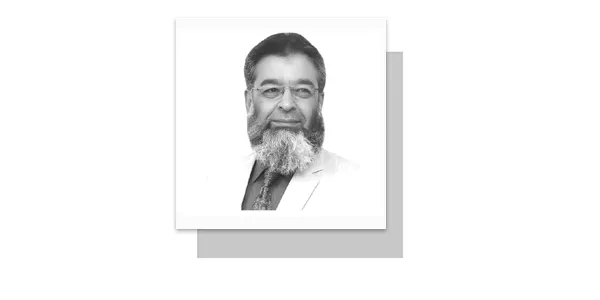THE life and personality of Prophet Muhammad (PBUH) have long inspired admiration, not only among Muslims but also from non-Muslim historians, thinkers, and writers. Their objective examinations of his life reveal the universality of his message, which transcends boundaries of faith, culture, and geography. He is often regarded as “a mercy to all of creation” (Rehmat-ul-Aalameen), a testament to his influence on humanity at large.
Scottish historian and philosopher Thomas Carlyle, in his famous work On Heroes, Hero-Worship, and the Heroic in History, praised the Prophet for his sincerity, wisdom, and unwavering commitment to his mission. Carlyle dismissed the false allegations against the Prophet and highlighted his qualities as a true leader. He wrote, “A silent great soul; one of that who cannot but be in earnest… He was to kindle the world; the world’s Maker had ordered so.” Carlyle’s admiration was not rooted in faith but in the Prophet’s exceptional leadership and character. His work categorizes heroes into various types, with the Prophet being recognized as a figure of immense historical impact.
Similarly, in 1978, Michael H Hart, an American astrophysicist and historian, ranked Prophet Muhammad (PBUH) as the most influential person in history in his book The 100: A Ranking of the Most Influential Persons in History. Hart emphasized that Prophet Muhammad (PBUH) was “the only man in history who was supremely successful on both the religious and secular levels.” Hart’s acknowledgment underscores the global significance of the Prophet’s teachings, which influenced both spiritual and political spheres.
Alphonse de Lamartine, a 19th-century French historian, also praised the Prophet in his work Histoire de la Turquie. Lamartine admired the Prophet’s profound character and his influence on the world, writing, “If greatness of purpose, smallness of means, and astonishing results are the three criteria of a human genius, who could dare to compare any great man in modern history with Muhammad (PBUH)?” His analysis, though from a non-religious perspective, affirmed the Prophet’s unparalleled contributions to history, especially in shaping religious, political, and social institutions.
Mahatma Gandhi, the leader of the Indian independence movement, expressed deep respect for the Prophet Muhammad (PBUH). Gandhi admired the simplicity, humility, and moral integrity of the Prophet’s life. He reflected, “I became more than ever convinced that it was not the sword that won a place for Islam in those days… It was the rigid simplicity, the utter self-effacement of the Prophet… his absolute trust in God and in his own mission.” Gandhi’s words underline the spiritual and moral virtues of the Prophet, which left an indelible mark even on non-Muslims.
Sir George Bernard Shaw, the renowned British philosopher and historian, also acknowledged the Prophet’s importance. In 1936, Shaw wrote in The Genuine Islam that Prophet Muhammad (PBUH) was “the savior of humanity.” Shaw believed that if the Prophet’s teachings were followed, they would lead to global peace and happiness. Shaw’s admiration for the practical and rational aspects of Islam demonstrates how non-Muslim intellectuals recognized the Prophet’s ability to establish a just and humane society.
Washington Irving, an American writer and historian, offered an insightful portrayal of the Prophet Muhammad (PBUH) in his 1850 book Mahomet and His Successors. Irving described the Prophet as a man of great virtue and wisdom, highlighting his leadership and personal sacrifices. He wrote, “He was sober and temperate in his diet and apparel, simple and unostentatious in his manners… brave and magnanimous toward his enemies.” Irving’s detailed account revealed a deep respect for the Prophet’s ethical character and leadership.
Karen Armstrong, a British religious historian, provided a more contemporary account of the Prophet’s life in her book Muhammad: A Biography of the Prophet, published in 1991. Armstrong emphasized the universality of the Prophet’s message, particularly his mission to create a just society. She noted, “Muhammad’s primary aim was to create a just society, in which the poor and vulnerable were treated with respect.” Armstrong’s work reflects her recognition of the Prophet as a compassionate and visionary leader, whose teachings sought to uplift all of humanity, regardless of faith.
Reverend Bosworth Smith, in his book Mohammed and Mohammedanism (1874), aimed to provide a balanced view of the Prophet Muhammad (PBUH) and Islam. Smith highlighted the similarities between Islam and Christianity in an effort to promote mutual understanding. He wrote, “He was Caesar and Pope in one; but he was Pope without the Pope’s pretensions, Caesar without the legions of Caesar.” Smith’s assessment emphasizes the Prophet’s ability to unite people and govern with justice and humility, qualities that extend his impact beyond the Muslim world.
These testimonies from various non-Muslim scholars, historians, and thinkers, spanning centuries and continents, demonstrate that Prophet Muhammad’s (PBUH) life and teachings have a universal appeal. His mercy, compassion, justice, and wisdom serve as a timeless example for humanity. The title “Rehmat-ul-Aalameen” (Mercy to all of Creation) aptly reflects his role not just as a religious leader for Muslims, but as a figure whose influence transcends faith and culture.
The relevance of Prophet Muhammad’s (PBUH) message in today’s world cannot be overstated. His teachings on peace, justice, and compassion remain as relevant today as they were over fourteen centuries ago. By studying the perspectives of non-Muslim scholars, it becomes clear that the Prophet is recognized not merely as a religious figure but as a global icon whose legacy continues to inspire people across faiths and generations. The enduring admiration for the Prophet, as expressed by these scholars, serves as a testament to the universal values he embodied and the timeless lessons he imparted to humanity.
—The writer is contributing columnist, based in Islamabad.










